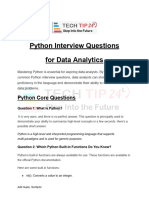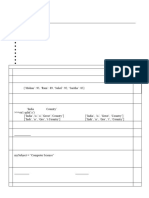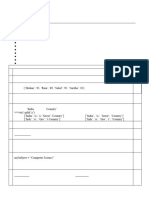Module 7 Python for data analytics Assignment
Uploaded by
anmolshrivastava0807Module 7 Python for data analytics Assignment
Uploaded by
anmolshrivastava0807MODULE – 7 ASSIGNMENT
Python for data analytics
Please implement Python coding for all the problems.
1) Please take care of missing data present in the “Data.csv” file using python module
“sklearn.impute” and its methods, also collect all the data that has “Salary” less than “70,000”.
2) Subtracting dates:
Python date objects let us treat calendar dates as something similar to numbers: we can
compare them, sort them, add, and even subtract them. Do math with dates in a way that
would be a pain to do by hand. The 2007 Florida hurricane season was one of the busiest on
record, with 8 hurricanes in one year. The first one hit on May 9th, 2007, and the last one hit
on December 13th, 2007. How many days elapsed between the first and last hurricane in
2007?
Instructions:
Import date from datetime.
Create a date object for May 9th, 2007, and assign it to the start variable.
Create a date object for December 13th, 2007, and assign it to the end variable.
Subtract start from end, to print the number of days in the resulting timedelta object.
3) Representing dates in different ways
Date objects in Python have a great number of ways they can be printed out as strings. In
some cases, you want to know the date in a clear, language-agnostic format. In other cases,
you want something which can fit into a paragraph and flow naturally.
Print out the same date, August 26, 1992 (the day that Hurricane Andrew made landfall in
Florida), in a number of different ways, by using the “ .strftime() ” method. Store it in a
variable called “Andrew”.
Instructions:
Print it in the format 'YYYY-MM', 'YYYY-DDD' and 'MONTH (YYYY)'
4) For the dataset “Indian_cities”,
© 360DigiTMG. All Rights Reserved.
a) Find out top 10 states in female-male sex ratio
b) Find out top 10 cities in total number of graduates
c) Find out top 10 cities and their locations in respect of total effective_literacy_rate.
5) For the data set “Indian_cities”
a) Construct histogram on literates_total and comment about the inferences
b) Construct scatter plot between male graduates and female graduates
6) For the data set “Indian_cities”
a) Construct Boxplot on total effective literacy rate and draw inferences
b) Find out the number of null values in each column of the dataset and delete them.
© 360DigiTMG. All Rights Reserved.
You might also like
- Module 7 Python For Data Analytics AssignmentNo ratings yetModule 7 Python For Data Analytics Assignment5 pages
- Object Oriented Programming: Numeriano B. Aguado John Ren G. SantosNo ratings yetObject Oriented Programming: Numeriano B. Aguado John Ren G. Santos75 pages
- Presentation_27073_Content_Document_20241108023604PMNo ratings yetPresentation_27073_Content_Document_20241108023604PM97 pages
- ITP107-Final Draft Module (20240529092814)No ratings yetITP107-Final Draft Module (20240529092814)74 pages
- GRADE 12 PREBOARD-1(Term-1) Computer ScienceNo ratings yetGRADE 12 PREBOARD-1(Term-1) Computer Science9 pages
- Python in Easy Steps Presentation: Presented by Syed Hussain RazaviNo ratings yetPython in Easy Steps Presentation: Presented by Syed Hussain Razavi32 pages
- Chapter No - 1: Overview of Python and Data Structures: Faculty Name: Vishal Parikh, Alpa RupalaNo ratings yetChapter No - 1: Overview of Python and Data Structures: Faculty Name: Vishal Parikh, Alpa Rupala6 pages
- Session1 - Analytics For Programming II - Siryani - 082224No ratings yetSession1 - Analytics For Programming II - Siryani - 08222433 pages
- Session2 - Analytics For Programming II - Siryani - 082924No ratings yetSession2 - Analytics For Programming II - Siryani - 08292431 pages
- Kendriya Vidyalaya Sangathan, Mumbai Region 1 Pre-Board Examination 2019-20No ratings yetKendriya Vidyalaya Sangathan, Mumbai Region 1 Pre-Board Examination 2019-2011 pages
- Prep2 Grade12 COMPUTERSCIENCECode 083 QP f80bf6740f9e485a90243bcdfa430572 41578No ratings yetPrep2 Grade12 COMPUTERSCIENCECode 083 QP f80bf6740f9e485a90243bcdfa430572 4157810 pages
- Module 1 Introduction to python - AssignmentNo ratings yetModule 1 Introduction to python - Assignment1 page
- Circulate: "Barya" Who Cares? It Is Just Few Cents By: Ariadne C. CasianoNo ratings yetCirculate: "Barya" Who Cares? It Is Just Few Cents By: Ariadne C. Casiano2 pages
- Updates To Cytation 3 For Gen5 Upgrade Compatibility: A. Instrument Base Code DownloadNo ratings yetUpdates To Cytation 3 For Gen5 Upgrade Compatibility: A. Instrument Base Code Download6 pages
- DWV, Are Used For Drainage, Waste and Vent. Commonly Used Are The Series 600 andNo ratings yetDWV, Are Used For Drainage, Waste and Vent. Commonly Used Are The Series 600 and2 pages
- Gobi SDK Integration Guide For Windows CENo ratings yetGobi SDK Integration Guide For Windows CE17 pages
- Complete Wellbeing From Woodland: A Critical Exploration of Links Between Trees and Human Health Alice Goodenough PDF For All Chapters100% (4)Complete Wellbeing From Woodland: A Critical Exploration of Links Between Trees and Human Health Alice Goodenough PDF For All Chapters62 pages
- Final Handbook On Accounting Treatment Under GST (20-6-19) PDF100% (3)Final Handbook On Accounting Treatment Under GST (20-6-19) PDF146 pages
- Global Health Law: International Law and Public Health PolicyNo ratings yetGlobal Health Law: International Law and Public Health Policy14 pages
- MHS Senior 5 Pure Maths Revision Questions 2020No ratings yetMHS Senior 5 Pure Maths Revision Questions 20201 page
- CAInsuranceDept - 2019-01-04 - First Amended Accusation Against XCelNo ratings yetCAInsuranceDept - 2019-01-04 - First Amended Accusation Against XCel25 pages
- TEKNION Expansion Cityline Brochure - Bluespace InteriorsNo ratings yetTEKNION Expansion Cityline Brochure - Bluespace Interiors15 pages
- Ge 120: Introduction To Oop For Geospatial Applications: Machine Exercise No.1No ratings yetGe 120: Introduction To Oop For Geospatial Applications: Machine Exercise No.12 pages






























































































